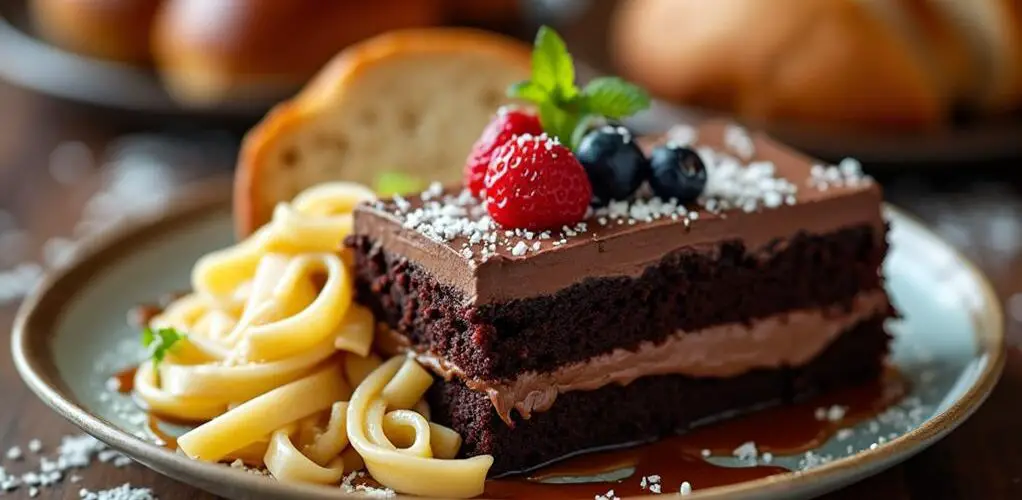
A ketogenic diet restricts foods high in carbohydrates to maintain ketosis, the metabolic state beneficial for fat loss. Foods not allowed include refined carbohydrates like white bread and pasta, sugary foods such as honey and sodas, and high-sugar fruits like bananas and grapes. Starchy vegetables, including potatoes and corn, should be avoided, as well as sweetened dairy products and processed snacks that are often high in hidden sugars. Alcoholic beverages, particularly those mixed with sugary mixers, can interfere with ketosis. Understanding what to limit is essential for success on a ketogenic diet, revealing more about optimizing health.
Key Takeaways
- Avoid refined carbohydrates like white bread and pasta due to their high carb content.
- Steer clear of sugary foods, including honey and flavored yogurts, to maintain ketosis.
- Limit high-sugar fruits such as bananas and grapes, which exceed daily carb limits.
- Exclude starchy vegetables like potatoes and corn from a keto diet.
- Be cautious of processed foods containing hidden sugars and refined carbohydrates.
Refined Carbohydrates
Although the allure of refined carbohydrates is undeniable, their high carbohydrate content makes them incompatible with a ketogenic diet. Foods such as white bread, pasta, and pastries are rich in refined carbs, which can greatly disrupt ketosis.
For instance, a single slice of white sandwich bread contains approximately 13 grams of carbohydrates, while a cup of cooked white pasta provides around 33 grams. Consuming refined carbohydrates can swiftly convert to glucose, disrupting the ketosis process. Refined carbs like these can quickly add up, exceeding the typical keto daily carb limit, which is often set at 20-50 grams to maintain the metabolic state of ketosis.
The keto impact of consuming refined carbohydrates is substantial, as they prevent the body from effectively burning fat for fuel. Ketosis relies on limiting carb intake to encourage the body to utilize stored fat as its primary energy source.
Therefore, incorporating refined carbs into a keto diet can hinder fat metabolism and derail weight loss efforts. To avoid this, individuals on a ketogenic diet are encouraged to seek alternatives such as mashed cauliflower or bread made from eggs, nuts, or seeds. These low-carb options help maintain ketosis, ensuring the body's fat-burning processes remain uninterrupted.
Alcoholic Beverages
Steering a ketogenic diet requires careful consideration of alcoholic beverage choices due to their potential carbohydrate content and impact on metabolism. Many alcoholic beverages, such as beer, can contain up to 13 grams of carbs per serving, posing a significant challenge for those adhering to a keto regimen.
Mixed drinks, often laden with added sugars, can further complicate dietary compliance. For instance, a piña colada contains approximately 32 grams of net carbs, far exceeding the typical daily carb allowance on a keto diet.
To navigate these challenges, individuals may explore:
- Low carb cocktails: Opt for cocktails made with sugar-free mixers and clear spirits like vodka or gin.
- Light beers: Although still containing around 6 grams of carbs per 12 oz can, they offer a lower-carb alternative to regular beer.
- Alcohol substitutes: Consider non-alcoholic options or beverages with low sugar content to minimize carb intake.
- Moderation: Even sugar-free options should be consumed in moderation to prevent surpassing daily carbohydrate limits.
It's essential to recognize that alcohol metabolism can hinder weight loss efforts on a keto diet, as the body prioritizes alcohol over fat for energy.
Therefore, mindful selection and consumption of alcoholic beverages are vital for maintaining ketosis and supporting weight management goals.
Sugary Foods
Sugary foods present significant challenges for those adhering to a ketogenic diet due to their high carbohydrate content.
High-carb sweeteners such as honey and maple syrup can quickly surpass daily carbohydrate limits, while sugary beverages like sodas not only disrupt ketosis but also provide no nutritional benefits.
Many of these sweeteners have high glycemic indexes, which can rapidly spike blood sugar levels, derailing ketosis efforts.
Additionally, processed snacks and flavored yogurts often contain hidden sugars, making them unsuitable choices for maintaining a state of ketosis.
High-Carb Sweeteners
Steering through the landscape of high-carb sweeteners is vital for anyone adhering to a ketogenic diet, as these sugary foods can greatly disrupt ketosis.
With the ketogenic diet's emphasis on low carbohydrate intake, understanding the impact of natural sweeteners and sugar substitutes becomes significant. Honey and maple syrup, both popular natural sweeteners, are particularly high in carbohydrates, with approximately 17g and 13g per tablespoon, respectively. Such figures necessitate heightened carbohydrate awareness, especially when engaging in keto baking or seeking sweetener alternatives for flavor enhancement.
To maintain ketosis, it's important to reflect on:
- Honey: 17g of carbs per tablespoon
- Maple Syrup: 13g of carbs per tablespoon
- Flavored Yogurts: Can contain up to 30g of carbs per cup
- Sweetened Condiments (e.g., ketchup): Roughly 3g of carbs per 9g packet
The health impacts associated with excessive carbohydrate consumption underscore the need for moderation strategies when incorporating any sweetening agents.
Sugary Beverages Impact
Often overlooked yet greatly impactful, sugary beverages present a formidable challenge for individuals on a ketogenic diet. Sodas, for example, can contain up to 39 grams of carbohydrates per 12-ounce serving, which considerably disrupts ketosis.
Similarly, fruit juices, despite being labeled as "natural," often hide high sugar levels with minimal fiber, resulting in a substantial carb intake; a single glass may harbor over 30 grams of sugar. Such high-carbohydrate content in these drinks can quickly exceed the daily carb limits recommended for those adhering to keto guidelines.
Moreover, beverage choices like sweetened iced teas and energy drinks add to the carb load with their high sugar content. Even sweetened coffee beverages can surpass 50 grams of sugar, posing a considerable barrier to maintaining ketosis.
Flavored sparkling waters, often perceived as healthier, may also contain added sugars, emphasizing the necessity for careful label scrutiny to avoid hidden carbs.
To mitigate these challenges, sugar alternatives in beverages can be viable options. Choosing zero-sugar drinks or those sweetened with keto-friendly alternatives such as stevia or erythritol can provide flavorful options without jeopardizing ketosis, ensuring alignment with dietary goals.
Fruit and Juices
Fruits and their juices, while rich in essential nutrients, pose a challenge for those adhering to a ketogenic diet due to their high carbohydrate content. Most fruits contain natural sugars, which can quickly add up, disrupting the low-carb intent of a keto regimen.
For instance, a single banana can contain about 24 grams of net carbohydrates, surpassing the daily carb allowance for many individuals on a keto diet. Fruit juices, even those marketed as 100% juice, are especially problematic due to their concentrated sugar levels and minimal fiber content. A standard 12-ounce serving of orange juice can contain roughly 26 grams of carbohydrates.
This significant carbohydrate intake can prevent achieving the metabolic state of ketosis, which is vital for improving insulin sensitivity and managing type 2 diabetes.
Given these considerations, certain fruits and their derivatives should be limited or avoided:
- Bananas, mangoes, and grapes: High in carbohydrates, unsuitable for keto.
- Fruit juices: High sugar concentration, low fiber.
- Dried fruits like Medjool dates: Extremely high in sugar.
- Pineapples and similar fruits: High carb content.
Instead, consider low-carb fruits such as berries, which in moderation can fit into a keto diet. For example, raspberries offer a lower-carb alternative, with approximately 1.7 grams of net carbs per 1/4 cup.
Prioritizing low carb fruits and exploring fruit alternatives is significant for maintaining ketosis.
Starchy Vegetables
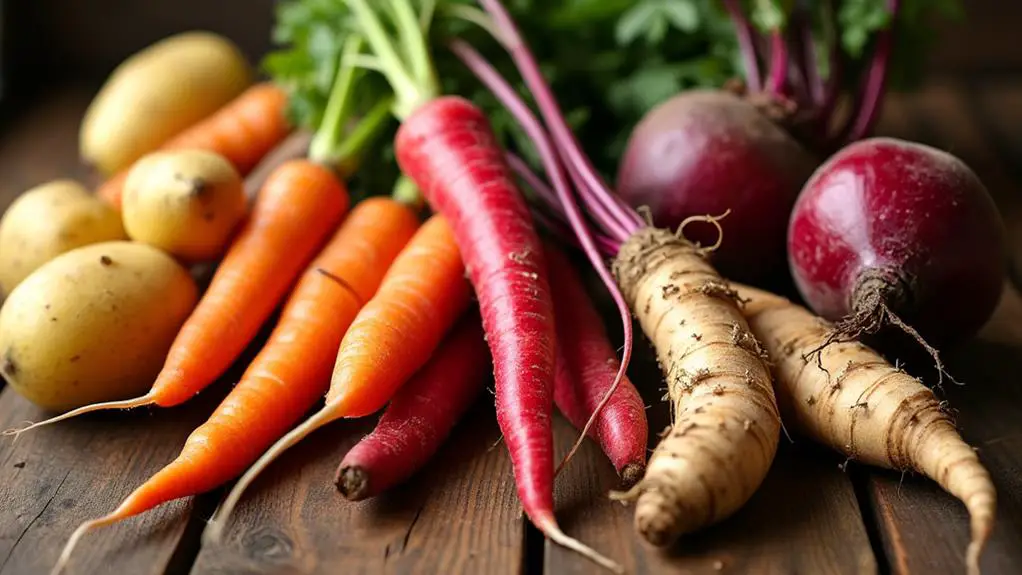
A considerable category of foods to monitor on a ketogenic diet is starchy vegetables, which are characterized by their high carbohydrate content. For example, potatoes, a common starchy vegetable, contain approximately 37 grams of carbs per medium potato, making them unsuitable for those aiming to maintain ketosis.
Similarly, sweet potatoes, with around 26 grams of carbs per medium serving, should be avoided when adhering to ketogenic guidelines. Corn is another vegetable high in starch, offering about 27 grams of carbs per cup, thereby making it incompatible with a low-carb, high-fat diet.
Peas, often perceived as a more benign vegetable option, still contain around 12 grams of net carbs per cup, which can considerably impact the carbohydrate limit necessary for a ketogenic state. Other starchy vegetables, such as cassava and yams, are also high in carbohydrates, and their inclusion in a ketogenic meal prep can hinder achieving or maintaining ketosis.
It's essential to focus on nutrient-dense options like leafy greens and non-starchy vegetables to support health without disrupting ketosis. For those committed to a ketogenic lifestyle, selecting low carb vegetables like leafy greens, zucchini, and cauliflower is essential.
These alternatives not only align with the dietary restrictions of keto but also offer versatility in meal preparation and nutritional benefits without disrupting ketosis.
Processed Foods
Processed foods frequently pose a significant challenge for individuals following a ketogenic diet due to their high content of hidden sugars and refined carbohydrates. These ingredients can disrupt ketosis, a metabolic state essential for the diet's effectiveness.
Additionally, the restrictive nature of keto may lead to nutrient deficiencies as processed foods often lack essential vitamins and minerals found in whole foods. For instance, potato chips, a common processed snack, can contain approximately 15 grams of carbohydrates per serving, making them unsuitable for those limiting carb intake.
Fast foods such as burgers and fries introduce not only hidden carb sources but also unhealthy fats, further complicating dietary adherence.
The dangers of processed foods extend to packaged snacks and meals, which often harbor unexpected carbohydrates. Crackers and pretzels, for example, frequently exceed 15 grams of carbs per serving.
- Potato chips: High in refined carbs, disrupting ketosis.
- Fast foods: Contain excessive unhealthy fats and carbs.
- Packaged snacks: High in refined carbs, exceeding dietary limits.
- Processed meats: Added sugars and preservatives increase hidden carb sources.
Moreover, frozen meals and pre-made casseroles present processed food dangers by concealing additional carbohydrates.
It is vital to meticulously read labels to manage carb intake effectively, ensuring compliance with ketogenic dietary goals.
Sweetened Dairy Products

Frequently underestimated in their impact on a ketogenic diet, sweetened dairy products pose a significant challenge due to their high carbohydrate content. Flavored yogurts, for instance, can contain up to 30 grams of carbohydrates per cup, primarily from added sugars. Similarly, low-fat and non-fat dairy products often compensate for reduced fat by increasing sugar content, making them unsuitable for individuals pursuing a keto lifestyle. Ice creams and flavored milks further exemplify this issue, with a typical serving of ice cream containing 20 grams or more of carbohydrates.
| Product | Carbohydrate Content per Serving |
|---|---|
| Flavored Yogurt | ~30g per cup |
| Ice Cream | 20g or more per serving |
| Plain Greek Yogurt | ~8g per 7 oz |
Understanding the carbohydrate content of these products is essential in managing a ketogenic diet effectively. Fortunately, there are viable sugar alternatives and dairy substitutes that can be incorporated into a keto regimen. Plain Greek yogurt, for instance, is a more appropriate choice, containing approximately 8 grams of carbohydrates per 7-ounce serving, along with beneficial protein and calcium. Exploring options like unsweetened almond milk or coconut milk can also be beneficial for those seeking to maintain ketosis while enjoying dairy alternatives. Selecting products with minimal sugar content is vital to adhere to the dietary restrictions of a keto diet.
Sugary Condiments
While sweetened dairy products can be a stumbling block for those maintaining a ketogenic diet, sugary condiments present another often-overlooked challenge. High sugar content can quickly disrupt ketosis, a state essential for the keto diet's success.
For instance, a single 9g packet of ketchup contains approximately 3g of carbohydrates, highlighting its unsuitability for low-carb regimes. Barbecue sauce is another culprit, packing around 4g of carbs per tablespoon, which can easily accumulate and derail dietary efforts. Sweet chili sauce stands out with its particularly high carbohydrate content, offering about 15g of carbs per 35g serving.
Additionally, the types of fats consumed on a keto diet—saturated vs. unsaturated—can greatly impact cholesterol levels, making it vital to choose high-quality fats.
Furthermore, many commercial salad dressings harbor hidden sugars, creating unexpected carbohydrate intake. This makes it vital to evaluate sugar alternatives and condiment substitutions to maintain ketosis.
Instead of traditional sugary condiments, individuals following a ketogenic diet might explore the following low-carb alternatives:
- Hot sauces: Typically low in carbs and high in flavor.
- Vinegar-based dressings: Provide tang without excessive carbs.
- Fat-rich mayonnaise: Offers creaminess with minimal carbohydrates.
- Homemade dressings: Allow control over sugar content, ensuring adherence to keto guidelines.
These alternatives not only align with ketogenic dietary needs but also enhance flavor without compromising nutritional goals.
Granola and Protein Bars
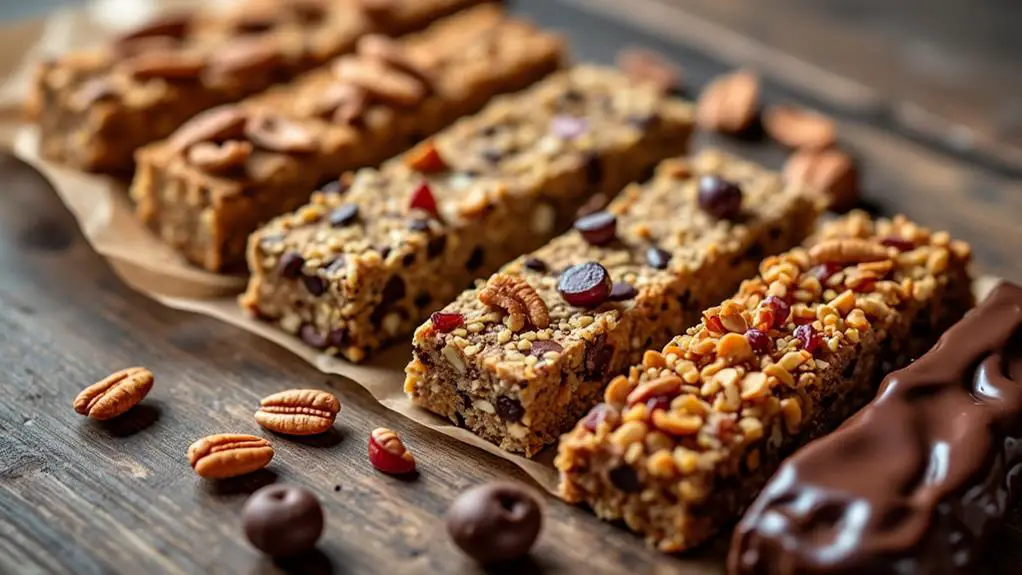
Granola and protein bars are often perceived as healthy snacks, yet their hidden sugar content and high-carb ingredients can make them unsuitable for a ketogenic diet.
Many of these bars contain oats, dried fruits, and other components that can lead to a carbohydrate content far exceeding the limits necessary to maintain ketosis.
This excessive carbohydrate intake can disrupt ketosis, preventing the body's ideal use of fat for energy and undermining the weight loss benefits of the keto diet.
For those adhering to a keto lifestyle, it is essential to opt for keto-specific alternatives that contain 5 grams or fewer of net carbs per serving to avoid disrupting ketosis.
Hidden Sugar Content
An often-overlooked aspect of maintaining a ketogenic diet is the hidden sugar content found in seemingly healthy snacks like granola and protein bars.
Despite their health-oriented marketing, many of these products can derail a keto regimen due to their high carbohydrate content. Hidden sugars are often present, with some granola bar brands containing over 15 grams of carbs per serving.
Protein bars are similarly deceptive, sometimes offering as much as 30 grams of carbs and added sugars per bar.
To navigate these pitfalls, it is essential to pay attention to nutritional labels, which can reveal the true carb content, often masked by marketing terms.
Agave syrup and honey, common ingredients in these bars, are high-carb culprits with agave syrup containing about 16 grams of carbs per tablespoon.
Being vigilant can help avoid such dietary missteps.
Key points to keep in mind include:
- Hidden sugars can greatly impact carb intake.
- Nutritional labels should be scrutinized for accurate carb counts.
- Agave syrup and honey add substantial carbs.
- Choosing low-carb or keto-friendly bars can reduce sugar intake.
Opting for bars specifically labeled as low-carb or keto-friendly can guarantee adherence to dietary goals, typically providing 5 grams of net carbs or less per serving.
High-Carb Ingredients
Understanding the composition of granola and protein bars is vital for anyone adhering to a ketogenic diet. These popular snacks often contain high levels of sugars and refined carbohydrates, making them unsuitable for maintaining ketosis. A typical granola bar may contain between 15 to 30 grams of carbohydrates per serving, with some brands exceeding 20 grams of sugar. This significant sugar content can easily disrupt ketosis, a metabolic state important for the keto diet's effectiveness.
Similarly, many protein bars, despite being marketed as healthy, can contain over 20 grams of carbohydrates. These bars often include hidden sugars and syrups that substantially contribute to their carb content. Ingredients like oats and rice, commonly found in protein bars, further increase the carbohydrate count, making them incompatible with keto dietary restrictions.
For those committed to keto, it is imperative to scrutinize food labels carefully. Some granola alternatives and protein bar options claim to be keto-friendly, but may still contain non-compliant ingredients. As a result, selecting specifically formulated low-carb or keto bars, which typically contain 5 grams of net carbohydrates or fewer per serving, is vital for maintaining ketosis and adhering to the dietary guidelines.
Keto-Friendly Alternatives
Steering through the world of granola and protein bars can be challenging for those following a ketogenic diet, given the high carbohydrate content typically found in these products.
Many commercial bars are laden with sugar, often containing upwards of 20 grams of carbohydrates per serving, which can disrupt ketosis. However, keto-friendly alternatives do exist. When selecting granola bars, it is essential to look for options specifically labeled as keto-friendly, which generally have 5 grams of net carbs or less per serving.
Here are some key considerations for keto snack options:
- Homemade Bars: Crafting your own bars allows you to control ingredients, using nut butters, seeds, and sugar-free sweeteners to maintain a low carb count.
- Keto-Focused Brands: Opt for brands that offer protein bars formulated for keto diets, often featuring collagen, nuts, and coconut, with around 2-5 grams of net carbs each.
- Ingredient Awareness: Always read nutrition labels carefully to avoid hidden sugars and high-carb content.
- Net Carbs: Focus on products with low net carb content to guarantee they fit within your dietary restrictions.
These strategies can help maintain ketosis while enjoying convenient keto snack options.
High-Carb Snacks
On a ketogenic diet, managing carbohydrate intake is crucial, making it important to be aware of high-carb snacks that can easily disrupt ketosis. Common snack choices such as potato chips, granola bars, and pretzels present a substantial carbohydrate load.
For instance, potato chips contain approximately 15 grams of carbs per serving, while granola bars can exceed 20 grams due to high sugar content. Pretzels, another popular choice, typically account for around 22 grams of carbs per serving, posing a significant risk to maintaining ketosis.
Additionally, hidden carbs can be found in processed foods, which often contain sugars and unhealthy fats, undermining dietary goals. Popcorn, a seemingly benign snack, is also problematic for keto adherence, with about 30 grams of carbs per 3-cup serving.
Many processed snacks, including packaged cookies and crackers, can contribute substantially to daily carb intake, often exceeding 15 grams per serving. These high-carb options can easily lead to exceeding daily carbohydrate limits, thereby disrupting the metabolic state of ketosis.
To avoid these pitfalls, individuals on a ketogenic diet should seek snack alternatives that align with their dietary goals. Keto-friendly options, such as cheese crisps, nuts, or vegetable sticks with guacamole, provide satisfying snacking experiences while keeping carbohydrate intake in check.
These alternatives help guarantee the successful maintenance of a ketogenic lifestyle.
Grains and Starches
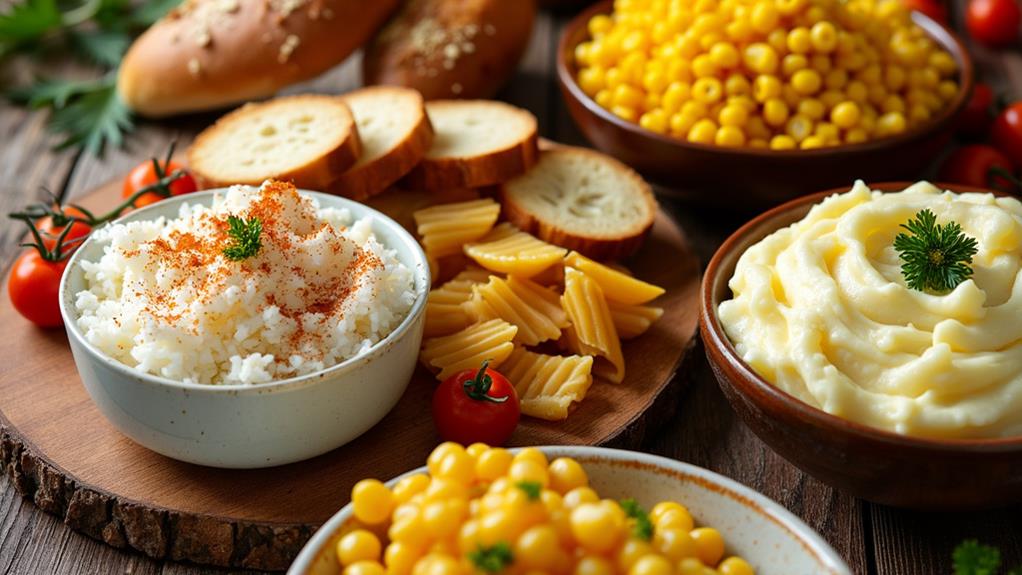
While high-carb snacks pose an immediate threat to ketosis, grains and starches represent another significant challenge for those adhering to a ketogenic diet. Grains such as rice, wheat, oats, barley, and quinoa are particularly problematic due to their high carbohydrate content. Typically, these grains contain over 15 grams of carbs per serving, making them unsuitable for maintaining ketosis.
Starchy vegetables like potatoes, corn, and sweet potatoes also contribute high amounts of carbohydrates, with a medium potato containing approximately 37 grams of carbs. For individuals on a keto diet, focusing on non-starchy vegetables like spinach and kale can provide essential nutrients without disrupting ketosis.
To maintain ketosis, individuals should aim for a daily carbohydrate intake of under 20-50 grams. Consequently, high-carb grains and starches must be avoided.
Consider these common sources of carbohydrates that should be eliminated:
- Legumes: Beans, chickpeas, and lentils are high in carbohydrates.
- Refined carbohydrates: Bread, pasta, pastries, and tortillas disrupt ketosis.
- Whole grains: Even whole grains like quinoa and barley are carb-heavy.
- Starchy vegetables: Potatoes and corn are rich in carbohydrates.
Instead, those on a ketogenic diet can explore grains alternatives and starch substitutes, such as cauliflower rice or zucchini noodles, to satisfy cravings without disrupting ketosis.
Maintaining awareness of carb content in foods is essential for successful adherence to the keto diet.
High-Sugar Fruits
A key consideration for those on a ketogenic diet is the avoidance of high-sugar fruits, which can greatly hinder the achievement of ketosis due to their increased carbohydrate content. This dietary regimen emphasizes low carb fruits and the use of sugar alternatives to maintain the necessary metabolic state. High-sugar fruits, such as bananas, grapes, mangoes, and pineapples, contain significant amounts of carbohydrates, making them unsuitable for individuals adhering to a keto lifestyle.
Below is a table highlighting the carbohydrate content of some high-sugar fruits:
| Fruit | Serving Size | Carbs (grams) |
|---|---|---|
| Banana | 1 medium | 24 |
| Grapes | 1 cup | 27 |
| Mango | 1 medium | 50 |
The consumption of these fruits can quickly exceed the daily carbohydrate limits prescribed by a ketogenic diet, thereby disrupting ketosis. Moreover, dried fruits like raisins and Medjool dates contain highly concentrated sugars, making them particularly problematic. For instance, a single Medjool date comprises approximately 18 grams of carbs.
Instead of these high-sugar options, individuals on a keto diet should focus on low carb fruits and explore sugar alternatives to satisfy their sweet cravings without compromising their carbohydrate intake.
Low-Fat Foods
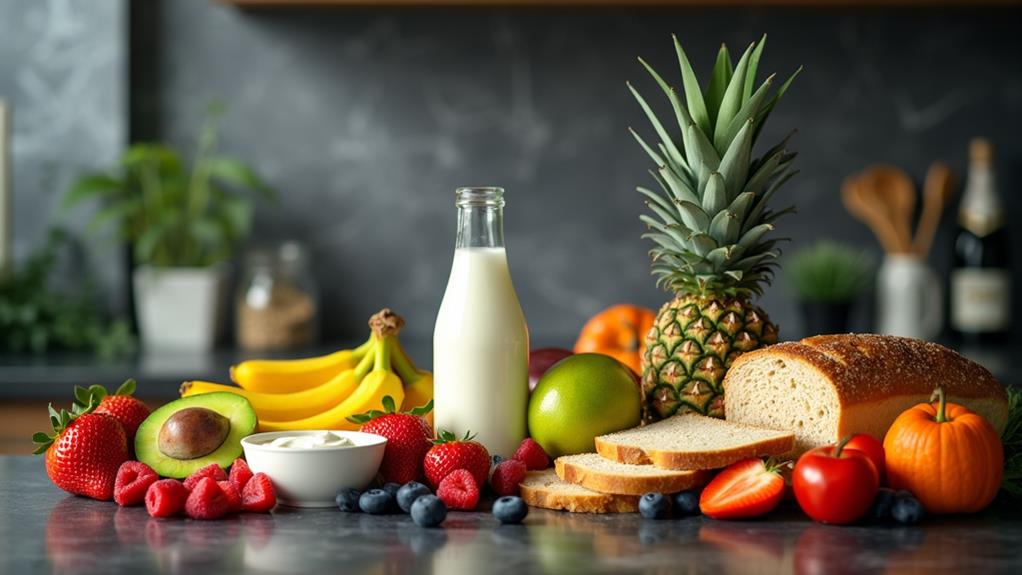
Many individuals mistakenly believe that low-fat foods are beneficial for maintaining a ketogenic diet, yet these items often pose significant challenges to ketosis.
The prevailing low fat myths suggest that reducing fat intake automatically leads to healthier choices. However, low-fat foods frequently contain hidden sugars to enhance flavor lost with fat reduction. This alteration renders them higher in carbohydrates, conflicting with the low-carb, high-fat requirements of a ketogenic diet.
For example, many low-fat yogurts may contain approximately 30 grams of carbohydrates per cup, primarily from added sweeteners.
Consider the following common low-fat foods that can disrupt ketosis:
- Low-fat yogurts: Often loaded with sugars and flavors, escalating carbohydrate content.
- Processed snacks: Low-fat chips and crackers typically contain hidden sugars, with around 15 grams of carbs per serving.
- Salad dressings: Low-fat variants may deceptively increase carb intake through high sugar content.
- Nutrition labels: Reading carefully is vital, as many low-fat products conceal carbohydrates that can hinder ketosis.
It is essential for those pursuing a ketogenic lifestyle to scrutinize product labels and remain vigilant about the deceptive nature of low-fat foods.
The hidden sugars within these items can impede ketosis, undermining the efficacy of a keto diet.
Sweetened Drinks
Sweetened drinks pose a significant challenge to maintaining a ketogenic diet due to their high sugar content and hidden carbohydrate sources.
Beverages such as sodas, fruit juices, and flavored waters often contain excessive carbohydrates that can disrupt ketosis, with a single serving of soda containing up to 39g of carbs.
Additionally, these drinks offer low nutritional value, as they typically lack essential nutrients and fiber, making them unsuitable for keto-friendly consumption.
High Sugar Content
Sugary beverages pose a significant challenge for those adhering to a ketogenic diet due to their high carbohydrate content. Many popular drinks, such as sugary sodas, fruit juices, and sweetened teas, are laden with sugars that can quickly derail your efforts to maintain ketosis.
A single 12-ounce serving of soda can contain up to 39 grams of carbohydrates, while energy drinks and sweetened iced teas often match or exceed this amount. These beverages contribute to increased blood sugar levels, which are counterproductive to the goals of a keto diet.
- Fruit Juices: Even freshly squeezed, they can spike blood sugar with their high natural sugar content.
- Energy Drinks: Some varieties exceed 30 grams of carbs per 16-ounce can, disrupting ketosis.
- Sweetened Iced Teas and Lemonades: Added sugars can result in over 20 grams of carbohydrates per serving.
- Alcoholic Beverages: Sweet cocktails and flavored beers can contain over 30 grams of carbs.
To align with a ketogenic lifestyle, consider sugar substitutes and beverage alternatives. Opting for unsweetened teas, water infused with lemon or mint, and sugar-free drinks can provide hydration without compromising ketosis.
These alternatives allow for enjoyment without the high sugar content that can hinder dietary progress.
Hidden Carbohydrate Sources
Beverages that appear harmless often mask significant carbohydrate content, posing a challenge for individuals on a ketogenic diet. Sweetened drinks, such as sugary sodas, represent a hidden carb source with a 12-ounce can of Coca-Cola containing approximately 39 grams of carbohydrates. This substantial carb count can swiftly derail ketosis, the metabolic state essential for a ketogenic regimen.
Misleading labels on fruit juices further complicate matters. While marketed as healthy, a cup of orange juice can harbor around 26 grams of carbs, surpassing the sugar content found in whole fruits.
Smoothies, often perceived as nutritious, can also be deceptive hidden carb sources. Many pre-packaged versions include added sugars, pushing the carb content to over 40 grams per serving.
Similarly, sweetened iced teas and lemonades are not exempt from scrutiny. Certain commercial brands may contain upwards of 30 grams of carbohydrates per bottle, undermining dietary goals.
Alcoholic mixers and cocktails, particularly those incorporating soda or juices, can further contribute to hidden carb intake. For instance, a piña colada can pack about 32 grams of carbs per serving, emphasizing the importance of vigilance in beverage choices.
Low Nutritional Value
Consuming sweetened drinks presents a significant challenge for those adhering to a ketogenic diet due to their low nutritional value and high carbohydrate content. Despite the appeal of their taste, sweetened beverages like sugary sodas, fruit juices, flavored teas, and energy drinks offer minimal nutritional density while contributing excessive carbohydrates that can disrupt ketosis.
A typical sugary soda can contain up to 39 grams of carbohydrates per 12-ounce serving, which is well above the daily limit for a ketogenic diet. Even fruit juices labeled as "natural" can contain over 30 grams of carbs per cup, with negligible fiber to offset the impact.
The low nutritional density of these drinks makes them poor choices in meal planning for keto followers. Consider the following:
- Sugary sodas: Up to 39 grams of carbs per 12-ounce serving
- Natural fruit juices: Often over 30 grams of carbs per cup
- Packaged sweetened beverages: Flavored teas and energy drinks with added sugars
- Mocktails and cocktails: High carb counts, some with 32 grams per serving
Even diet sodas, while lower in carbohydrates, contain artificial sweeteners that may influence insulin response and cravings.
Consequently, prioritizing nutrient-rich, low-carb beverages is essential for effective keto meal planning.
Frequently Asked Questions
What Foods Are Banned on Keto Diet?
Understanding keto diet misconceptions is essential. High carb snacks, including bread, pasta, and sugary beverages, are banned due to their carbohydrate content, which disrupts ketosis. Additionally, starchy vegetables and most fruits should be avoided.
What Foods Should I Avoid on Keto?
In keto meal planning, prioritize low carb snacks and avoid foods high in carbohydrates, such as grains, starchy vegetables, and sugary items. Restrict fruits, particularly bananas and dried fruits, which hinder maintaining ketosis due to concentrated sugars.
What Foods Can I Eat Unlimited on Keto?
On a keto diet, unlimited consumption is generally allowed for non-starchy vegetables, healthy fats, and certain proteins. Incorporating these into keto meal prep and keto snack ideas can aid in achieving dietary goals effectively.
What Are the Top 10 Keto Foods?
The top 10 keto foods include fatty fish, eggs, avocados, spinach, broccoli, zucchini, almonds, chia seeds, cheese, and olive oil. These options support keto meal prepping and provide low carb snacks, sustaining nutritional ketosis effectively.
Conclusion
To summarize, adherence to a ketogenic diet necessitates the exclusion of various food categories that are high in carbohydrates and sugars. This includes refined carbohydrates, sugary foods, grains, and starchy vegetables, all of which can impede the metabolic state of ketosis. Additionally, certain beverages such as alcohol and sweetened drinks, along with high-sugar fruits and low-fat foods, are also contraindicated. The careful selection of foods is essential to maintain the low-carbohydrate intake characteristic of ketogenic dietary protocols.
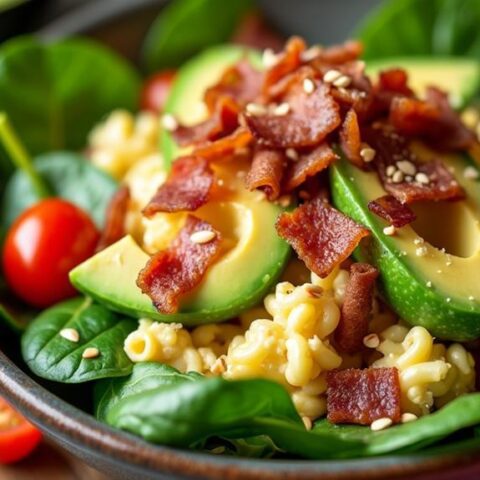


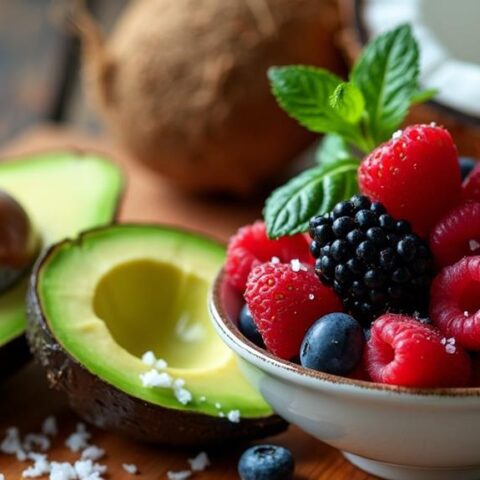

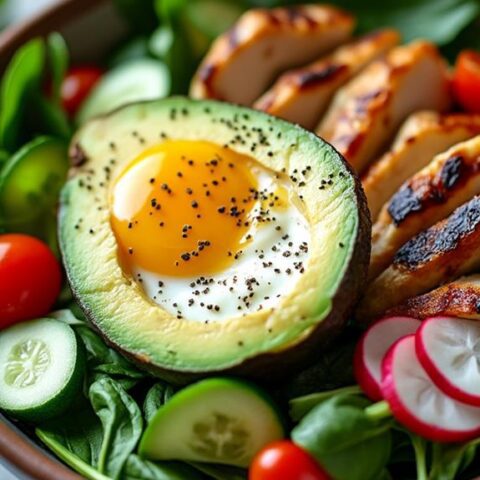




No Comments